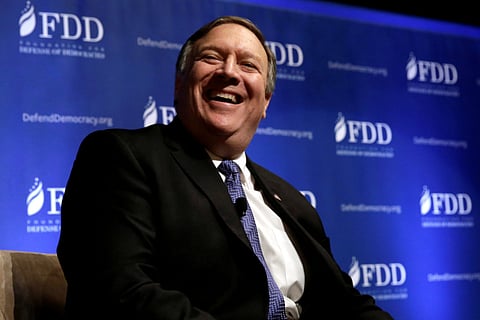In Pompeo, Trump sees policy concurrence
On issue after issue, the new secretary of state sounds too similar to the US President

n Iran: In commenting to reporters on the appointment, Trump singled out the Iran nuclear agreement as an issue on which he disagreed with Tillerson. But with Pompeo, continued the president, “we have a very similar thought process.” Pompeo has indeed been a fervent foe of the 2015 nuclear agreement. While in Congress, he pursued every possible avenue to discredit it. He talked of “secret side deals” that the Obama administration had allegedly made with Iran and has played down the costs of bombing Iran. As director of the CIA, Pompeo has likened Iran to Daesh (the self-proclaimed Islamic State of Iraq and the Levant) and added that Iran is allied with Al Qaida, even ordering another dive into already-exploited documents captured in the raid that killed Osama Bin Laden.
n North Korea: Pompeo has consistently taken one of the most hawkish lines on dealing with Pyongyang. He appears focused on regime change as the one sure way to resolve the North Korean problem. Last week, he told Fox News that “never before have we had the North Koreans in a position where their economy was at such risk, where their leadership was under such pressure.” The United States, he says, should make “no concessions” in any negotiations. This advice is a prescription for the near certain failure of any United States-North Korea summit meeting. The regime of Kim Jong-un is not on the verge of collapse. Pompeo’s advice may increase rather than decrease the danger of war as a result of a meeting.
n Russia and election interference: Going back to his time in Congress, Pompeo has taken the most highly partisan posture possible on this subject. While he was a member of the House Intelligence Committee, he sought to score political points using emails that had been hacked and stolen from the Democratic National Committee. As CIA director, he inaccurately stated publicly that the US intelligence community had determined that Russian interference did not affect the outcome of the 2016 election, whereas in fact the community had specifically said that it was making no judgement on that question. He later had to amend that statement, but clearly Pompeo’s priority is to protect the president — not the integrity of American elections.
n Climate change: During his confirmation hearing, Pompeo — a major recipient of campaign funding from the climate-change-denying Koch brothers — refused to respond to a question about whether he accepts the reality of climate change and human impact on it. His description of the Paris agreement on climate change as a “costly burden” is another echo of Trump’s inclinations and an indication that as secretary of state he will oppose any renewed steps toward keeping the planet habitable. Previously Rex Tillerson was hailed as one of the “adults” in the administration whose main contribution has been to restrain Trump’s impulses. Tillerson’s replacement seems set to encourage them.
— New York Times News Service
Paul R. Pillar is a US academic and a CIA veteran.



